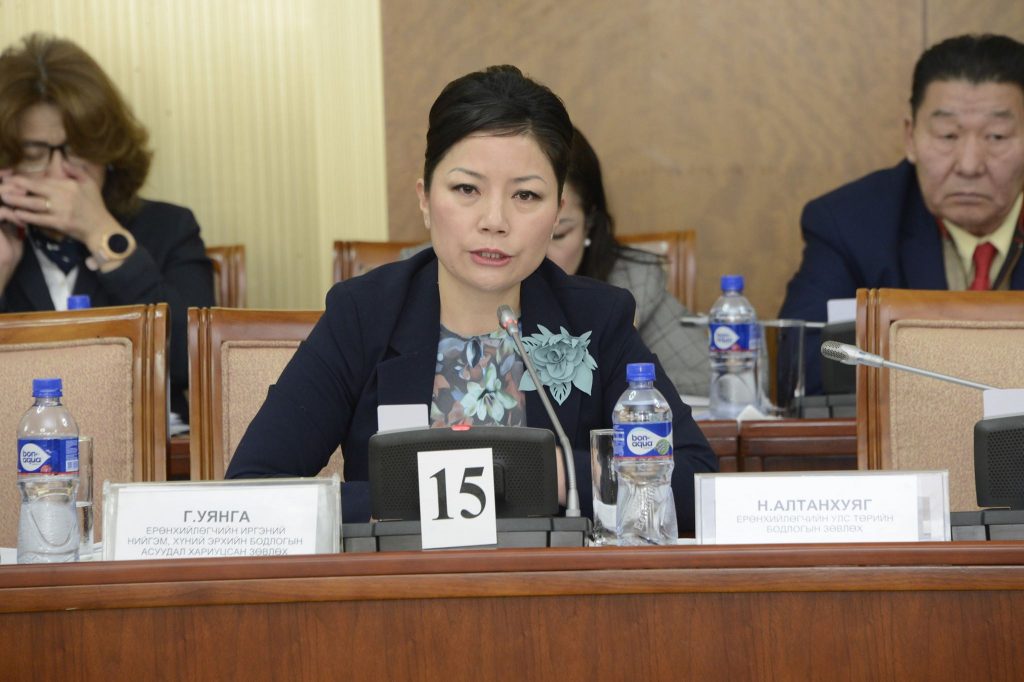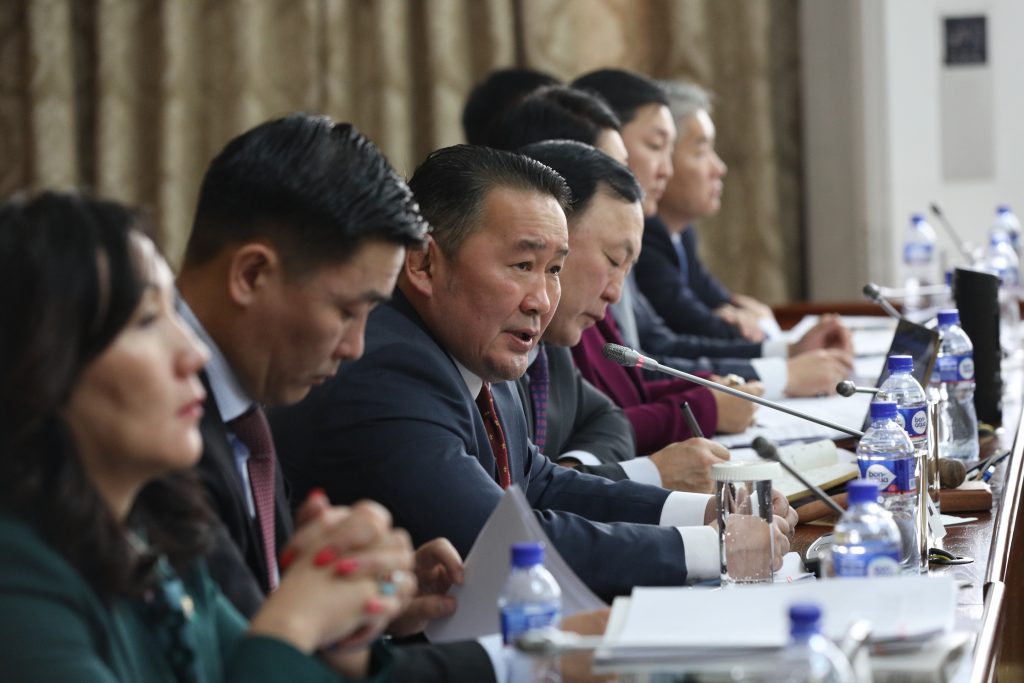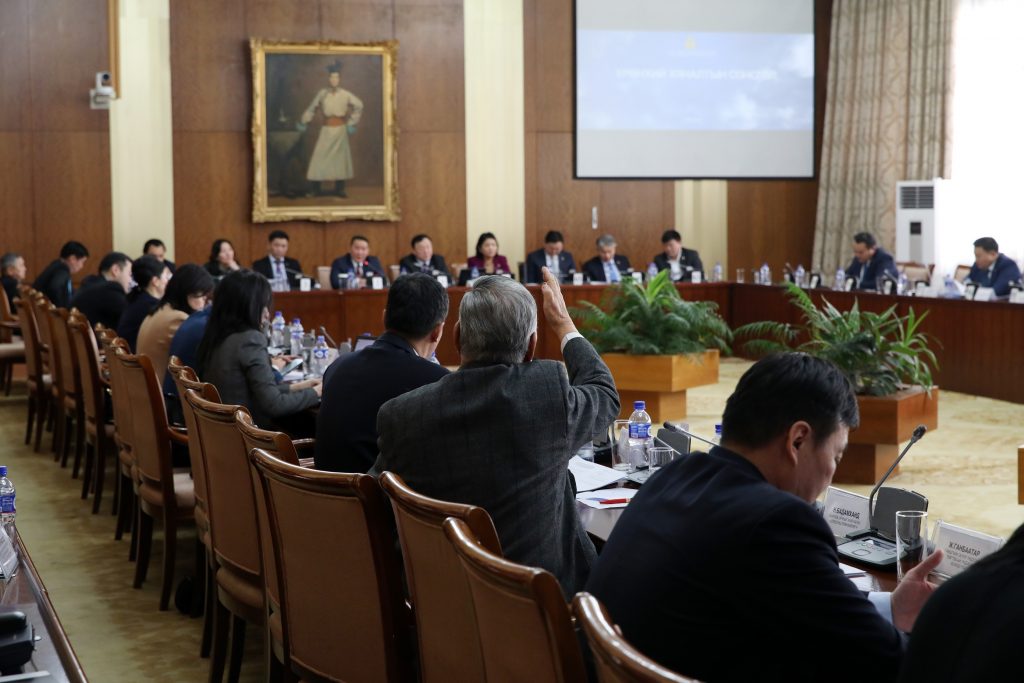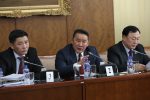PRESIDENT ATTENDS GENERAL INQUIRY HEARING ON AIR POLLUTION
President of Mongolia Khaltmaagiin Battulga forwarded an official letter on Organizing a General Inquiry Hearing to Chairman of the State Great Khural M.Enkhbold on December 10th, 2018.
In accordance with Article 8 of the Law on Public Hearing, which states that “A General Inquiry Hearing is mandatory when it has been requested by the President of Mongolia,” the Standing Committee on Environment, Food and Agriculture of the State Great Khural held the hearing today in the State Palace.
At the beginning of the hearing, Civil Society and Human Rights Policy Advisor to the President G.Uyanga delivered the speech of President Battulga on his behalf which reflected his views regarding the General Inquiry Hearing to assess the performance of institutions and officials in charge of implementing policy, decisions, and regulations on air pollution reduction.

The speech read:
“For more than a decade, Mongolia has fought in vain against the challenge of air pollution and smog which has poisoned all residents of the capital city and provincial capitals and inflicted irremediable damage on their health, while seriously violating the fundamental rights of Mongolians to a safe and healthy living environment, and the problem escalates every year. Scientists and experts keep warning us that the number of premature deaths caused by air pollution will reach 5,200-14,000 in five years or in 2024 if the current levels of air pollution remain unchanged.
Despite the continuous air pollution reduction dialogues and heavy paperwork for many years, nothing has been accomplished. A huge sum of money has been wasted. In the decade between 2008 and 2019, MNT 170 billion was allocated from the State Budget on air pollution reduction measures whereas foreign loans and aids worth USD 104.7 million were spent. In spite of producing a number of documents, including the New Infrastructure Development Medium-Term Program, the Law on Development Policy and Planning, the Law on Air, the Law on Air Pollution Charges, the National Air and Environmental Pollution Reduction Program, resolutions and regulations adopted by the Parliament and the Cabinet, and a recommendation by the National Security Council, setting up a number of funds and working groups, and financing them with loans, we didn’t see any tangible outcome, yet the situation has deteriorated.
The New Infrastructure Development Medium-Term Program, adopted by the Parliament in 2010 with Resolution No. 26, was a comprehensive program-integrated policy to combat air pollution. The program encompassed many important objectives and actions, including ensuring the citizens’ right to a safe and healthy living environment, managing internal migration with policy, improving planning and administration in the regions and regional centers and satellite cities, boosting urban development and planning and apartment sufficiency owing to the necessity to develop infrastructure promptly, reducing air pollution, supporting urban and rural development and industry, and decelerating migration. Unfortunately, this comprehensive program has been subdued for more than a decade by smoke-free stove and fuel businesses of an interest group seeking profit. If only we implemented this program with focus on the funding and organizational coordination instead of aiding private businesses with budget money, over a decade was long enough to rid Ulaanbaatar of the smoke.
Moreover, there were even media reports on audit findings which disclosed that MNT 327 million was spent on launching the website www.agaar.mn, MNT 197 million on media, and MNT 2.4 billion was transferred to news websites for publicity purposes. Evidences show that MNT 932 million was spent on only the operational expenditure of the Clean Air Fund in 2011-2015.
The individual who embezzled MNT 5.1 billion from the Clean Air Fund and bought himself luxury car and expensive shoes is still at large.
The length of time spent struggling against air pollution, the amount of money expended, the results achieved, and the actual threat of air pollution on the lives and health of the people clearly indicate that the corresponding government institutions and officials and entities and companies gaining profit from the smoke possibly committed crimes that are stated in the Criminal Code of Mongolia, including of abuse of power, accepting, offering, and mediating bribe, neglect of duty, and misuse of budget funds. This can be fully proven by certain evidences including a performance audit report on the Outcome of Externally and Internally-financed Air Pollution Reduction Actions of the Clean Air Fund in 2008-2016, conducted by the National Audit Office, and the 2011-2015 performance report of the Clean Air Fund, which is a government special fund.
If we were to assess the mentioned reports and evidences and point out the illegal activities and actions with elements of crime and offense, they are far too many, and there are plenty of attention-worthy issues that must be investigated as a case in regard to the selections organized within the framework of policy, projects, and measures to reduce air pollution, the product experimentation and compliance with standards, the accuracy of supply volume and selling rate of products and services, and the appropriateness of government spending.
I recently handed in an official letter to Prosecutor General and Chief Advisor of Justice M.Enkh-Amgalan that calls for focusing on such issues that are violating the fundamental rights of Mongolians to a safe and healthy living environment, investigating reports concerning illegal activities, crimes and offenses that were committed within the framework of actions and projects aiming to reduce air pollution, and holding the culprits responsible.
In accordance with Clause 1 of Section 2 of Article 25 of the Constitution of Mongolia, which states that “The State Great Khural may declare a state of emergency under natural disasters or other unforeseen dangers which threaten or may threaten directly the life, health, well-being and security of the population in the whole or a part of the country’s territory,” I, as the President, forwarded a proposal to battle air pollution under a state of emergency in December, 2017. The Chairman of the State Great Khural responded saying “… air pollution is not considered to be a disaster, hazard, or accident…and there is no legal foundation to conclude that a circumstance extraordinary enough to declare a state of emergency has arisen.” In my belief, the current situation where the capital city hospitals are overloaded with adults and children suffering from flu and pneumonia, thousands of babies are dying in their wombs, and it is impossible to open the window and breath fresh air is extraordinary enough to declare a state of emergency. In 2007, scientists who wanted to research into blighted ovum could hardly find 20 cases nationwide, but now a statistical report of a single maternity hospital reveals that there were 470 cases of blighted ovum in 2013, and the number has reached 1,300 today. This is the statistical report of a single hospital. According to the scientists, the number of blighted ovum cases, which was over 700 on the national level in 2013, has been growing at geometric rate to reach 4,400 in 2017, and this is not a fully accurate report. When about 15-17 thousand Mongolians lose their lives prematurely every year, the thousands of fetal deaths is an unquestionable situation to declare a state of emergency. We can’t afford to stand back when there is a chance to declare a state of emergency, centralize all the human and state resources on actions to reduce air pollution, implement urgent measures in consequent phases, and produce results in a short amount of time.
There is a necessity to declare a state of emergency urgently, centralize budget funds, and coordinate and unify the organization of every action taken on all levels. Last year, I put together a research team to conduct a comprehensive study on the feasibility of reducing air pollution. There are 230 thousand households in the ger areas of Ulaanbaatar, 30 thousand of which are in the suburban districts including Nalaikh, Baganuur, and Bagakhangai. There are 200 thousand households living in heavily polluted areas. On the other hand, there were more than 30 thousand apartments that are ready for moving in and over 80 thousand apartments that would be commissioned in 2018. This situation should be settled first. It should be organized in a way that the move-in ready apartments are purchased by public servants on a salary loan, and furthermore, by citizens who have any kind of regular income on an interest-free loan. By doing so, the unsold apartments will be circulated and more land will be freed. It is possible to reduce air pollution by at least 50 percent in a short time in Ulaanbaatar. Arrangements must also be made to prevent the cleared yards in ger areas from being occupied by the next smoke producer. This work doesn’t require money but only organizational coordination.
It is indeed unfortunate that instead of seizing our opportunity to significantly reduce air pollution in a short amount of time by integrating our funds and organizational forces, a stove and fuel-selling business has been made out of it. While sorting out the previous actions and holding the guilty accountable, it is essential to lead the fight against air pollution to a new stage, unify under the integrated policy, and provide management and organizational coordination.
Attributable to this reason and based on Sections 1 and 2 of Article 8 and Clause 1 of Section 2 of Article 8 of the Law on Public Hearing, I made a proposal to hold a General Inquiry Hearing with the purpose of inspecting the performance of institutions and officials in charge of implementing policy, decisions, and regulations on air pollution reduction and clarifying the outcome of actions that were taken and the expenditure of funds that were allocated for these actions.”

Present at the General Inquiry Hearing were, President Battulga, Chief of Staff to the President Z.Enkhbold, and Advisor on Environmental, Urban and Rural Development and Air Pollution Policy to the President D.Purevdavaa who gave remarks as well.



